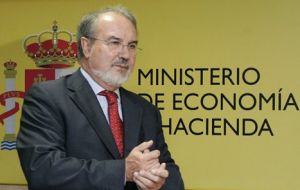MercoPress. South Atlantic News Agency
Spain admits 2009 recession deepest in half a century
 Finance Minister Pedro Solbes
Finance Minister Pedro Solbes Spain faces its deepest recession in half a century admitted Finance Minister Pedro Solbes anticipating the economy will contract 1.6% this year. In July, the minister had predicted a 1% expansion.
Solbes has pledged some 90 billion Euros of stimulus measures in a battle to hold the economy together as the fallout from the housing crash and the credit crunch rips through its manufacturing and service industries. "The financial crisis that exists at the moment at the global level has changed the scenario very drastically" Solbes said. In 2009, "we're going to live through the most difficult moments of the crisis". He added that Spain's economy will return to growth next year, expanding 1.2%, and 2.6% in 2011. Economic activity in services contracted at the fastest pace on record in November, while manufacturing posted its biggest monthly decline in December. The number of jobless claimants jumped by almost a million last year, sending unemployment to 13.4% by November, compared with Solbes's July forecast for 10.4%. Solbes said the economy shrank during the second half of 2008, confirming the country is already in a recession. Unemployment this year will reach 15.9% before falling to 14.9% in 2011, Solbes said. Spain's budget deficit will peak at 5.8% of GDP this year and then narrow to 3.9% of GDP in 2011. That will mean Spain exceeds the European Union's 3% deficit limit for four straight years. Solbes faced criticism from political opponents in Spain for pushing through a budget based on the 1% forecast even as he admitted it was out of date. In December 2007, he said that the economy would grow by 3% this year, even as the US mortgage meltdown shut off the flood of credit that fuelled Spain's home-building splurge. "Problems are still appearing and they are getting more and more serious" said Antonio Argandona, professor at Iese business school in Madrid. "The recovery plan may be much more expensive than they think and it may not even work", he added.




Top Comments
Disclaimer & comment rulesCommenting for this story is now closed.
If you have a Facebook account, become a fan and comment on our Facebook Page!